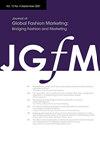Lying by telling the truth – the risks of deception by paltering and hypocrisy in corporate social responsibilities context
IF 5.5
Q2 BUSINESS
引用次数: 0
Abstract
ABSTRACT This research investigated how fashion corporations’ paltering-based deceptive marketing, specifically related to corporate social responsibility (CSR), might influence consumers. Specifically, it investigated if it evokes hypocrisy perceptions to influence consumers’ purchase decisions and how the mediating roles of consumer-corporation-relationship and consumer-based corporate-reputation can explain such influences. Using a two-factor online experiment (paltering x message replications), data were collected from 252 US consumers. PROCESS results indicated that CSR-paltering positively evoked hypocrisy and, in turn, dampened consumer-corporation-relationship and corporate-reputation. Such hypocrisy significantly reduced purchase-intentions, but only when mediated through consumer-corporation-relationship. No significant negative relationships between deception and purchase-intentions were observed when mediated by hypocrisy alone or combined with corporate-reputation. Additionally, paltering directly influenced relational and reputational evaluations. The novelty of this research lies in its focus on paltering-based deception, prevalent within the fashion industry, and how technically true yet misleading CSR marketing influences consumers. This study also responds to the urgent scholarly calls for investigating deception’s role in consumers’ hypocrisy and adds how this new type of deception is also an attributing factor. Further, it provides corporations insight into how CSR paltering, despite its technically true information, can damage consumers’ relational and reputational attachments and their behavioral intentions if discovered.通过说实话撒谎——在企业社会责任背景下,通过奉承和虚伪进行欺骗的风险
摘要本研究调查了时尚企业基于欺骗的营销,特别是与企业社会责任(CSR)相关的营销,如何影响消费者。具体而言,它调查了是否会引发虚伪的感知来影响消费者的购买决策,以及消费者-企业关系和基于消费者的企业声誉的中介作用如何解释这种影响。使用双因素在线实验(paltering x消息复制),从252名美国消费者中收集数据。PROCESS结果表明,企业社会责任的削弱正引发虚伪,进而削弱消费者与企业的关系和企业声誉。这种虚伪明显降低了购买意愿,但只有在通过消费者-公司关系进行调解的情况下。当仅以虚伪为中介或与公司声誉相结合时,在欺骗和购买意图之间没有观察到显著的负面关系。此外,贬低直接影响了关系和声誉评估。这项研究的新颖之处在于,它关注的是时尚行业中普遍存在的基于欺骗的欺骗行为,以及技术上真实但具有误导性的企业社会责任营销如何影响消费者。这项研究也回应了学术界对调查欺骗在消费者虚伪中的作用的迫切呼吁,并补充了这种新型欺骗是如何成为归因因素的。此外,它还让企业了解,尽管企业社会责任的信息在技术上是真实的,但如果被发现,它会如何损害消费者的关系和声誉依恋以及他们的行为意图。
本文章由计算机程序翻译,如有差异,请以英文原文为准。
求助全文
约1分钟内获得全文
求助全文
来源期刊

Journal of Global Fashion Marketing
BUSINESS-
CiteScore
6.90
自引率
31.60%
发文量
34
期刊介绍:
The Journal of Global Fashion Marketing is a quarterly journal that publishes peer-reviewed conceptual and empirical papers and business cases of original works that significantly contribute to the overall advancement of marketing theory, research, and practice in fashion, design, and culture. JGFM endeavors to be a “global bridge” connecting marketing scholars and practitioners in fashion, design, and culture throughout the world. We publish high-quality scholarly articles on marketing written by contributors representing the leading academic authors. As we state on the cover of every issue, our positioning statement, our value added to the marketing scholar readership, is truly to “Bridge Fashion and Marketing” 1. Monitor and analyze global fashion marketing trends. 2. Generate and integrate new ideas and theories related to fashion, luxury, and culture marketing theory and practice. 3. Apply new research methods and techniques in fashion, luxury, and culture marketing. 4. Explore and disseminate cutting edge fashion marketing practices. JGFM welcomes manuscripts that provide fresh, innovative insight to any topic in the field of fashion, luxury, and culture marketing. Both conceptual and empirical works are valued, so long as the manuscript addresses substantive issues in marketing.
 求助内容:
求助内容: 应助结果提醒方式:
应助结果提醒方式:


